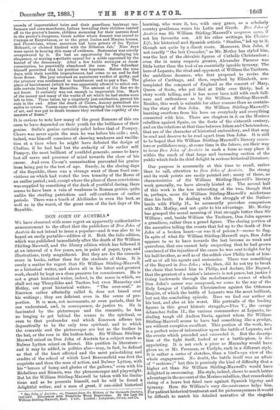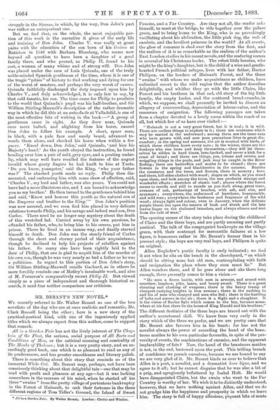DON JOHN OF AUSTRIA.* WE have observed with some regret
an apparently authoritative announcement to the effect that the publishers of Don John of Austria do not intend to issue a popular—and it was also to be hoped an easily portable—edition of it. Both the folio edition, which was published immediately after the death of Sir William Stirling-Maxwell, and the library edition which has followed it at an interval of a few years, are, in point of paper, type, and illustrations, truly magnificent. But they are for the connois- seurs in books, rather than for the students of them. It is surely a matter for regret that Sir William Stirling-Maxwell, as a historical writer, and above all in his latest and greatest work, should be kept as a close preserve for connoisseurs. He is not a great historical writer, indeed, in the sense in which, we shall not say Thucydides and Tacitus, but even Macaulay and Motley, are great historical writers. "The over-soul," as Emerson rather affectedly called it, does not brood over his writings ; they are deficient even in the sense of pro- portion. It is men, not movements, or even periods, that he can understand, and, in consequence, do justice to. He is fascinated by the picturesque and the romantic, he has no longing to get behind the scenes to the spiritual, or even to that profounder real which Emerson affirms too dogmatically to be the only true spiritual, and to which the romantic and the picturesque are but as the feather in the hat, or the rose in the button-hole. Sir William Stirling- Maxwell seized on Don John of Austria for a. subject much as Bulwer Lytton seized on Rienzi. His position in literature— and it may be added, in politics also—may, in fact, be defined as that of the least affected and the most painstaking and erudite of the school of which Lord Beaconsfield was first the exquisite and then the man of action, and Bulwer Lytton, with his "heroes of hemp and glories of the gallows," even with his Richelieus and Rienzis, was the phrasemonger and playwright. But let Sir William Stirling-Maxwell be taken with his limita- tions and as he presents himself, and he will be found a delightful writer, and a man of great, if one-sided historical
• Don John of Auttria ; or, Passages from the History of the Sixteenth Century, 1547-1578. Dlustrated with Numerous Wood Engravings. By the Late Sir William Stirling-Maxwell, Bart. 2 vols. London : Longmans, Green, and Co. learning, who wore it, too, with easy grace, as a scholarly country gentleman wears his Latin and Greek. Don John of Austria was Sir William Stirling-Maxwell's magnum opus, if not his favourite son. All his other writings, his Cloister Life, his historical and Spanish artistic "Studies," led up to it, though not quite by a direct route. Moreover, Don John, if not exactly "the last Crusader," as Mr. Motley has styled him, was the last of the chivalric figures of Catholic Christendom ; even the in many respects greater, Alexander Farnese was little better than the tool of an essentially ignoble tyranny. The hero of Lepanto, the rival and opponent of William the Taciturn, the ambitious dreamer, who first proposed to revive the glories of Carthage, and then, repulsed by Elizabeth, con- templated the conquest of England as the consort of Mary, Queen of Scots, who yet died at little over thirty, had a story worth telling, and it has never been told with such full- ness and enthusiasm as by Sir William Stirling-Maxwell. Besides, this work is valuable for other reasons than as contain- ing the story of Don John. Sir William Stirling-Maxwell's learning overflows from his hero on everybody and everything connected with him. There are chapters in it on the Morisco rebellion against Spain, on the fleets of the sixteenth century, and on the relations at that time between Islam and Christendom, that are of the character of historical embroidery, and that may be read and deserve to be read apart from Don John. It is still to be hoped that Sir William Stirling-Maxwell's literary execu- tors or publishers may, at some time in the future, see their way to issue Dome John. of Austria in such a form as may place it within the reach of that large and increasing section of the public which finds its chief delight in serious historical literature.
Our purpose is necessarily at this time to recall, rather than to call, attention to Don John of Austria. Its strong and its weak points are easily pointed out; many of them, as characteristics of Sir William Stirling-Maxwell's literary work generally, we have already hinted at. The second half of this work is the less interesting of the two, though that is, perhaps, more Sir William Stirling-Maxwell's misfortune than his fault. In dealing with the struggle of the Nether- lands with Philip II., he necessarily provokes comparison with Mr. Motley, and not quite to his advantage. Mr. Motley has grasped the moral meaning of that struggle better than Sir William ; and, beside William the Taciturn, Don John appears a grandiose, rather than a grand figure. The closing portion of the narrative telling the events that led up to the death of Don John of a broken heart—or was it of poison P—seems to flag. In spite of what Sir William Stirling-Maxwell says, Don John appears to us to have towards the last become so weak and querulous, that one cannot help suspecting that he had grown convinced of the injustice of the cause he was sent to fight for by his half-brother, as well as of the selfish view Philip took of him- self as of all his agents and emissaries. There was something of the Bayard in Don John ; why, then, did he not try to break the chain that bound him to Philip, and declare, like Bayard, that the greatest of a nation's interests is not peace, but justice P Going backwards through the melodramatic scenes of which Don John's career was composed, we conic to the war of the Holy League of Catholic Christendom against the Ottoman Empire, of which the battle of Lepanto was the most brilliant, but not the concluding episode. Here we find our author at his best, and also at his worst. His portraits of the leading figures in this great historic struggle,—Pius V., the savage debauchee Selim II., the various commanders at Lepanto, in- cluding tough old Andrea Doria, against whom Sir William Stirling-Maxwell seems to have had something like a grudge, are without exception excellent. This portion of the work, too, is a perfect mine of information upon the battle of Lepanto, and the events which preceded and succeeded it. But the descrip- tion of the fight itself, looked at as a battle-piece, is dis- appointing. It is not such a piece as Macaulay would have given us, or Mr. Freeman, or Carlyle, each in a different style. It is rather a series of sketches, than a bird's-eye view of the whole engagement. No doubt, the battle itself was an affair of "sections ;" but this is precisely the kind of difficulty that a higher art than Sir William Stirling-Maxwell's would have delighted in overcoming. His style, indeed, shows to much better advantage in the account of the Morisco rebellion, that remarkable rising of a brave but fated race against Spanish bigotry and tyranny. Here Sir William's very discursiveness helps him. For patient historical treatment and for picturesqueness it would be difficult to match his detailed narrative of the singular
struggle in the Sierras, in which, by the way, Don John's part was rather an unimportant one.
But we find that, on the whole, the most enjoyable por- tion of this work is the narrative it gives of the early life and training of Don John. Charles V. was really at great pains with the education of the son born of his liaison at Ratisbon in 1546 with Barbara Blomberg, who seems now beyond all question to have been a daughter of a good family there, and who proved, as Philip IL found to his cost, a woman of many whims and of strong will. Don John was placed under the care of Luis Quixada, one of the truly noble-minded Spanish gentlemen of the time, whom it is one of the tragic "pities" of history to find working and dying for one of the worst of masters, and perhaps the very worst of causes. Quixada faithfully discharged the duty imposed upon him by Charles V., and duly acknowledged, it is only fair to say, by that cold fanatic, his son. The time came for Philip to proclaim to the world that Quixada's pupil was his half-brother, and Sir William Stirling-Maxwell's description of the rather dramatic way in which he did this at an auto-da-fe at Valladolid, is one of the most effective bits of writing in the book :—" A group of gentlemen came in sight. As they drew near, Quixada once more halted, and alighting from his horse, caused Don John to follow his example. A short, spare man, in black, with a pale face and sandy beard, advanced to- wards them alone, and checked his horse when within a few paces. 'Kneel down, Don John,' said Quixada, and kiss his Majesty's hand.' As the youth obeyed the instruction, he found bending over him a pair of cold, grey eyes, and a pouting under- lip, which may well have recalled the features of the august invalid whose gouty fingers he had knelt to kiss at Yuste. Do you know, youngster,' said the King, 'who your father was ?' The abashed youth made no reply. Philip then dis- mounted, and embracing him with some show of affection, said, Charles V., my lord and father, was also yours. You could not have had a more illustrious sire, and I am bound to acknowledge you as my brother.' He then turned to the gentlemen behind him and said, 'Know and honour this youth as the natural son of the Emperor and brother to the King.'" Don John's position was now assured, and we soon find him placed in very delicate relations towards Philip, and his savage and indeed mad son, Don Carlos. There need be no longer any mystery about the death of this wretched lad. Carried away by his own passions, he offended his father, who, to bring him to his senses, put him in prison. There he lived in an insane way, and finally starved himself to death. Don John was the steady friend of Carlos through the short and stormy period of their acquaintance, though he declined to help his projects of rebellion against his father. So many sins have been rightly laid to the door of Philip, that one is glad to acquit him of the murder of his own son, though he was very nearly as bad a father as he was a politician. In regard to this portion of Don John's story, Sir William Stirling-Maxwell recalls Gachard, as in others he more forcibly reminds one of Motley's invaluable work, and also of M. Forneron's comparatively recent Philip II. But viewed simply as a piece of independent and thorough historical re- search, it need fear neither comparison nor criticism.







































 Previous page
Previous page